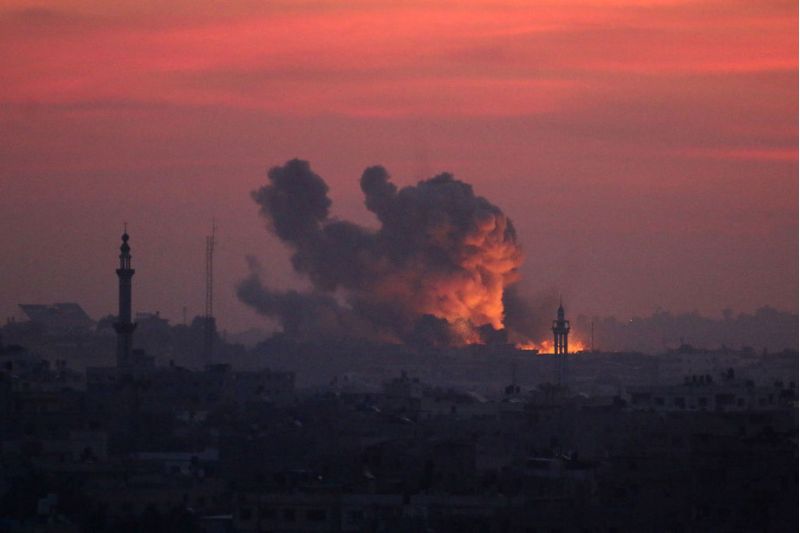By day Gaza is news and images in the media. Perhaps we avoid them. Perhaps we read about the latest deaths and diplomacy, look at the photos, glance at the opinion pieces that justify or criticise Israel and Hamas, or that set the war in the larger geopolitical interests of the various actors, including Australia. But some delicacy, some despair, some supressed feeling may hold us back from dwelling on it. We concentrate on the business of our daily lives.

But sometimes at night Gaza returns. It becomes personal. For some of us it comes linked to biblical texts such as that of the prophet Jeremiah speaking of the destruction of the Northern kingdom, ‘In Ramah a voice was heard, lamentation, and weeping, and great mourning, Rachel weeping for her children, and would not be comforted, because they are not’.
We imagine the mothers in Gaza keening for their children who have been killed, the children who were left maimed and orphaned and who will never again be touched in love, the families scrabbling at rubble desperate not to leave their crushed children unburied, the children crying out for food and water which their parents cannot give them, the children whose last memories of their parents were of gunfire, the children who in another universe could be our children. And we hear the echo of Rachel weeping for for their children who are no more. In night there is no comfort.
During the day we nod as we see the plausibility of all the arguments. Yes, Hamas started this war; Yes, Israel has the right to defend itself. Yes, many Israeli people have died in the war. Yes, their lives are as precious as those of the people of Gaza; Yes, many peoples have a historic claim on the same land. Yes, Israel is a democracy. Yes, Hamas fights and hides hostages among civilians. Yes, a ceasefire is of itself no solution. Yes, there are other players arming each side in the war with their own aims. Yes, more people died in other wars. Yes, it is not in Australia’s interests to separate ourselves from our powerful friends. And yet these arguments bring no comfort.
But sometimes at night, we may hear again the voice of lamentation, weeping and great mourning. We see the cities lie in ruins; the houses, the apartments, the shops, the mosques and market places are now rubble; the hospitals, havens of healing, are now places of death; the delicate network of daily human living is now torn apart. We smell the fear that precedes each drone, each bomb, each shell, each scattering of a family. We see the families who have fled from the city into tents and other cities, and touch their terror as bombs fall close. We taste the bitterness of hunger, the humiliation of fighting one’s friends for food. And we look into the eyes of children who know only this as their world. And Rachel weeps for her children who are no more. At night no comfort comes.
By day, we feel for the Jewish and Palestinian communities in our land who grieve for dead relatives, fear for their nations, are enraged at their nations’ enemies, and who experience abuse on the grounds of their religion, race and national origin. And perhaps we march for peace and support our friends in these communities. Yet these things bring little comfort.
But sometimes at night the voice of lamentation cries out again to us as we look out over a stricken land of our hungry, homeless, humiliated brothers and sisters. We try to imagine the faces of the thirty thousand dead, to look into their eyes one by one, children, women and men. We see also the faces of the millions of people still alive, marked with grief, weariness, anger or despair. And we notice the faces of the many of those living who envy the dead. At night we find no comfort.
'By day, we feel for the Jewish and Palestinian communities in our land who grieve for dead relatives, fear for their nations, are enraged at their nations’ enemies, and who experience abuse on the grounds of their religion, race and national origin. And perhaps we march for peace and support our friends in these communities. Yet these things bring little comfort.'
In daytime, we wonder what will be become of Gaza and Israel in thirty years’ time. By then the surviving children will be adults carrying the memories and the scars of this war. Will the relationships between the people of Israel and their neighbouring peoples be dominated by fear and hatred magnified by this war and controlled only by military power? And what will serve the interests of other powerful nations? Such questions bring no comfort.
But sometimes at night, if faith has shaped our imagination, we may see the thirty thousand persons who have died in white robes, washed in the blood of the lamb, each valued, each alive. And we may be led to pray for all those whose lives have been blighted by this war – the people who live in fear, hunger, grief and isolation as a result of it - that they might live securely and be free. We may pray also for the leaders responsible for it, the soldiers involved in the killing and devastating, and the people who have supplied the weapons, and all the people of Israel and Gaza, for a change of heart that looks in the eyes of the persons whom their decisions maim and kill, and seeks peace through respect.
Such prayer does not bring comfort. But it may foster hope against hope.
Andrew Hamilton is consulting editor of Eureka Street, and writer at Jesuit Social Services.
Main image: Gaza at sundown. (Ahmad Hasaballah/Getty Images)